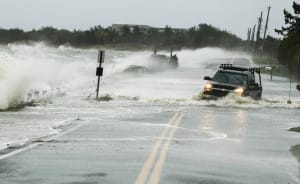 Local Projects in Boston, New York City, San Francisco, and Fort Lauderdale Receive Grants Totaling $80,000
Local Projects in Boston, New York City, San Francisco, and Fort Lauderdale Receive Grants Totaling $80,000
WASHINGTON (March 7, 2014) — Four grants totaling $80,000 have been awarded to four Urban Land Institute (ULI) district councils as part of ULI’s Resiliency Grant program. The grant money will support local projects that help advance ULI’s work in helping develop long-term urban design and real estate strategies to making cities both more resilient and adaptable to the impact of climate change.
The grants are part of the institute’s larger program of work on climate change, sustainability, and resiliency. The funding for the Resiliency Grant program is provided through an $800,000 grant from The Kresge Foundation that was awarded last year. The Kresge Foundation grant is intended to help ULI leverage the substantial expertise of its members to provide guidance on community building in a way that responds to inevitable climate change and sea level rise, and helps preserve the environment, boost economic prosperity, and foster a high quality of life. The funding will support the institute’s efforts to protect the overall health, economic vitality, and well-being of the nation’s communities and its citizens; focus attention on the urgency of long-range resilience planning; influence land use decision makers who impact the built environment; and create a series of local level education programs through ULI’s district and national councils.
The local resiliency grant program was available only to ULI district and national councils. Winners were required to contribute or raise at least $20,000 in matching funds, for a total amount at least $40,000. Applicants were required to submit a comprehensive overview of the specific resiliency issue, along with the proposed solutions to address the issue.
The recipients of the 2014 ULI Resiliency grants are:
- ULI Boston: Living with Water: The Urban Implications – While the evidence continues to mount that sea level rise will deeply impact the Greater Boston region, property owners, planners, developers and city officials do not have the tools they need to prepare the city for potential catastrophe. Through past ULI events, key stakeholders have started to understand the threats. This, however, is not enough. With “Living with Water: The Urban Implications,” Boston-area decision makers will have the opportunity to explore solutions together and begin to move to action through understanding climate preparedness best practices.
- ULI New York: Assessing the Economic Value of Investing in the MTA System – ULI New York’s Infrastructure Council will focus on the importance of protecting, hardening and upgrading the Metropolitan Transportation Authority (MTA) system in the wake of Hurricane Sandy, tying the economic competitiveness of the New York Metropolitan Region to investment in a strong, resilient system. Hurricane Sandy had devastating effects on the MTA system, shutting it down for nearly one week and causing nearly $4.7 billion dollars in damages. While future interruptions of such a scale present a huge risk to a regional economy that depends on the reliability of public transit, the justification of increased investment in maintaining reliability and increasing resilience needs to be made to the key stakeholders and elected officials. The project will seek to demonstrate that the New York Metropolitan Region’s globally competitive economy is dependent on such investments.
- ULI San Francisco: Best Practices for Resiliency Planning – ULI San Francisco plans to convene up to three advisory panels that will each focus on a group of existing sub-regional or regional sea level rise initiatives for the purpose of providing critically needed technical assistance to advance these resiliency initiatives.
- ULI SE Florida/Caribbean: City of Fort Lauderdale TAPs: Developing Long-Term Strategies for Resiliency in the Face of Climate Change – ULI SE Florida/Caribbean will work with the City of Fort Lauderdale to develop strategies focusing on the issue of climate resiliency for two key areas in the City: redevelopment along an urban core amenity known as Riverwalk and an area recently named the Uptown neighborhood. The issues surrounding development along the New River (Riverwalk) include sea level rise impacts, sustaining the corridor’s walkability in light of rising seasonal temperatures/changing weather patterns, and other concerns such brought about by seasonal hurricanes/tropical storms. The second TAP area, Uptown, has been designated in the City’s new Vision Plan and recently updated Comp Plan as a possible site for growth with resiliency emphasis.
Resiliency Grant Review Committee member David Mayhood, president of The Mayhood Company, noted the critical importance of fostering resilience strategies and practices at the local level. “District Councils continue to create a lasting impact in their communities and I am thrilled this grant program has further facilitated that process,” said Mayhood.
The grant recipients were selected by a review committee of ULI members and staff. In addition to Mayhood, other members were Phil Payne, chief executive officer, Ginkgo Residential; Greg Johnson, president, Wright Runstad & Company; Kathleen Carey, chief content officer, ULI; David Howard, executive vice president for development and foundation, ULI; Heidi Sweetnam, senior vice president for community outreach, ULI; and Corinne Abbott, senior vice president for foundation relations, ULI.
###
About the Urban Land Institute
The Urban Land Institute (uli.org) is a nonprofit education and research institute supported by its members. Its mission is to provide leadership in the responsible use of land and in creating and sustaining thriving communities worldwide. Established in 1936, the Institute has more than 30,000 members worldwide representing all aspects of land use and development disciplines.

